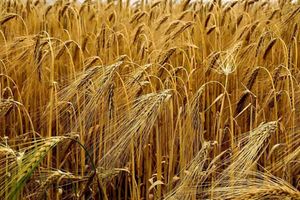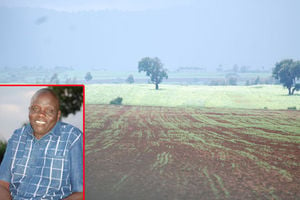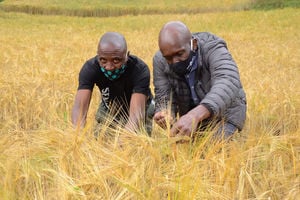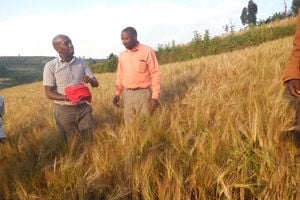
Mr Justin Okot, an extension worker (right), shows farmers striga weed, which affects cereal crops in Teso and Sebei sub-regions. PHOTO/DERICK WENANI
Farmers in Sebei Sub-region are switching to barley growing in search of better profits. Some of the farmers have since abandoned Irish potatoes for barley growing, which is a raw material in beer making.
They farmers say the cereal is profitable and that it matures within a short time.
Ms Winnie Chelimo, a resident of Kapchorwa Municipality, says she has majored in barley production due to its ready market.
"It is profitable compared to Irish potatoes, for example, Irish goes for Shs40,000 a bag (100kgs) and barley is 150,000 a bag (100kgs) and yet there is ready market and Nile Breweries has set up a dryer whereby our grains are not affected in terms of quality,’’ Ms Chelimo said.
Mr Charles Semikwo, another farmer, said he opted for barley because it is a short-term crop.
“There is a ready market and within only three months, the crop is mature. I appeal to all people in Sebei to join the business of farming barley to change their lives,” he said.
Mr Augustine Chemayek, another barley farmer, however, said they face challenges of poor road network that hampers transportation of their harvests.
“We face challenges of poor road network and lack of money to buy chemicals to spray if our crops are being attacked by pests,” he said.
Currently, there are more than 13,000 farmers of Barley and Sorghum in the district of Kween, Bukwo and Kapchorwa, which makes up the sub-region.
Barley has two seasons, the first one, starts from March-May and second, in August- October.
Each bag can fetch more Shs152,000. Each kilogramme of barley goes for Shs1,500.
Ms Clare Cherop, an extension officer in charge of Kapchorwa, said they mobilise and train farmers.
"We are skilling farmers to produce quality cereals and also training them on harvesting and post harvesting handling,’’ she said.
Ms Cherop added that they have ensured that farmers are provided with the necessary facilities to produce clean cereals that meet brewing standards.
She said production of barley has improved over the years, with Sebei as the leading region in barley growing in the country.
“The transformation of farmers into barley farming has been tremendous and yields have improved,” Ms Cherop said.
She, however, said the farmers face challenges of changing weather patterns, poor road network , and lack of enough land, among others.
Ms Cherop also revealed that as a company, they have a sustainability programme for farmers of barley and sorghum in the region.
“We want to ensure that all farmers are connected, skilled and financially empowered,” he said.
Extension workers are supporting farmers with knowledge and skills, with NBL partnering in training programmes.
“Over the years, we have put in place different programmes to help them improve their yields and welfare of the communities,’’ he said. [email protected]




